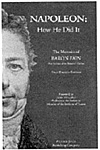
Author: Baron Fain
Pages: 230
Illustrations: 5 Black and white including endpaper diagrams of the Tuileries and Napoleon's chambers.
Maps: None
Footnotes: 98
Appendices: None
Bibliography: None
Index: None
Publisher: Proctor
Jones Publishing Company, San
Francisco, California (available in the
U.S. through Stackpole Books,
Pennsylvania).
Publication
Date: 1998. First English edition of
the original 1829 manuscript.
Binding: Cloth
(hardbound)
ISBN: 1-885446-02-0
Price: $39.95
Summary: This is a
book that should be on the required
reading list of every Napoleonic buff.
From 1806 to 1815, Baron Fain was first a
secretaryarchivist, and later Napoleon's
personal secretary. His knowledge and
unique insight into Napoleon's methods
and thinking are of an incontestable
value to students of this period.
Agathon-Jean-Franqois Fain was constantly at the Emperor's side through victory and defeat, in garrison as well as on campaign from 1806 to 1814, then returned for the Hundred Days in 1815. This book is rich in unpublished information (in English), and is a rare look into Napoleon's personal and professional habits and routines.
Fain describes Napoleon's meticulous and efficient management style. Napoleon's selection criteria for trusted officials and military appointees is also fascinating reading. The Emperor's travel itineraries in Europe outside of the military campaigns give the reader an appreciation for Napoleon's diplomatic efforts and achievements.
Whenever Napoleon traveled, the cabinet and ministers traveled with him. A mobile printing press, several coaches, headquarters and staff field tents, and department secretaries were all part of the Imperial entourage. In this fashion Napoleon could attend to affairs of the Empire on the road nearly as easily as back in Paris.
Regarding the military, Fain details the organization of the staff of the Grande Armee. He discloses that Napoleon was little concerned with what he would do in case of success, but much with what he would have to do in case of failure. Countering those critics who believed Napoleon acted only by chance and by whim, Fain describes him as a man who calculated with the utmost care all the elements of the decisions he had to make.
Far from the "Ogre of Corsica" as his enemies and detractors have labeled him, Fain writes vividly of the Emperor's generosity to his subjects, servants, and loyal soldiers. These financial gifts always came from his personal funds and not those of the treasury. According to Fain, other observers have described Napoleon as sensitive, good-natured, and capable of pity. In these pages, he is neither vicious nor vindictive.
Although Fain is indeed biased, his personal affection and loyalty to the Emperor speak well for the man that some so-called experts charge was a "sociopath" or suffered from such things as "narcissistic personality disorder" - clinically ill people rarely inspire the sort of admiration or display the behavior observed in Fain's account.
Ultimately, it is hard to argue with noted French scholar Jean Tulard, who, in his foreword, commends this book:
"Here are the finest memoirs written on the organization of Napoleon's cabinet and the work of the Emperor at the height of the Empire."
More Book Reviews
-
Book Review: The Greenhill Napoleonic Wars Data Book
Book Review: Napoleon: How He Did It
Book Review: A Soldier for Napoleon
Book Review: 1815 The Waterloo Campaign
Book News
Back to Table of Contents -- Napoleon #14
Back to Napoleon List of Issues
Back to MagWeb Master Magazine List
© Copyright 1999 by Napoleon LLC.
This article appears in MagWeb (Magazine Web) on the Internet World Wide Web.
The full text and graphics from other military history magazines and gaming magazines are available at http://www.magweb.com
Order Napoleon magazine direct